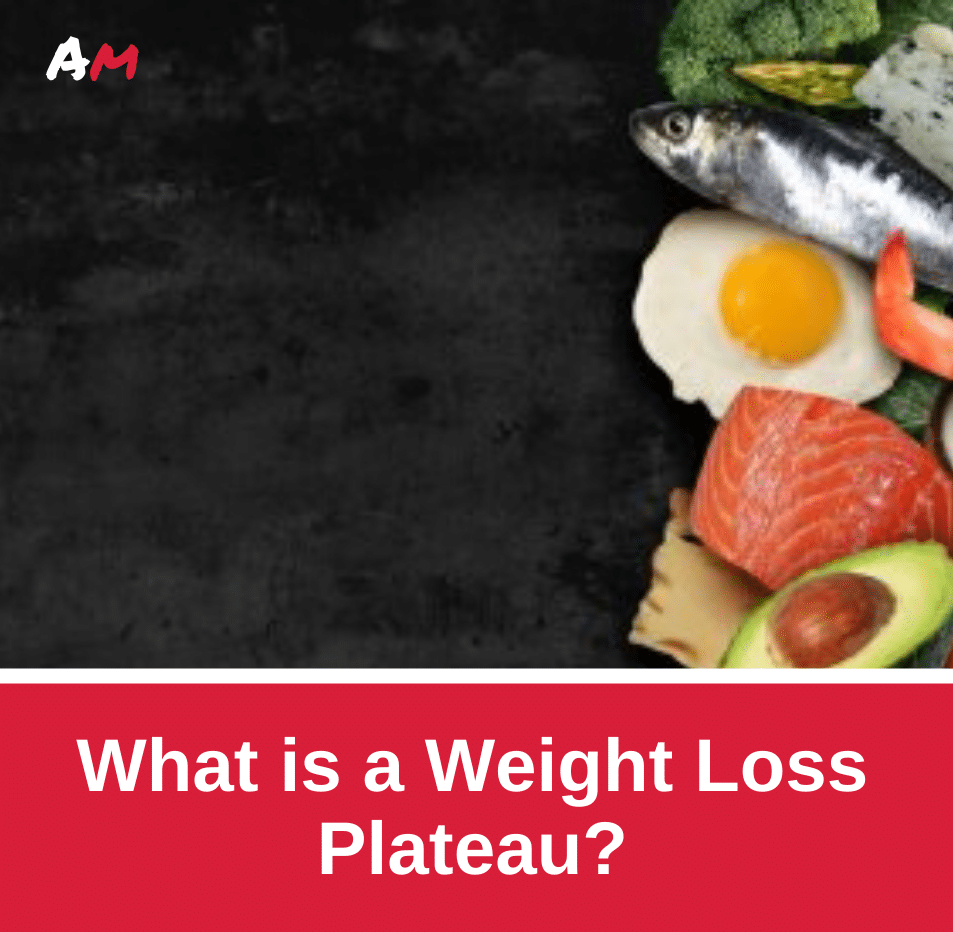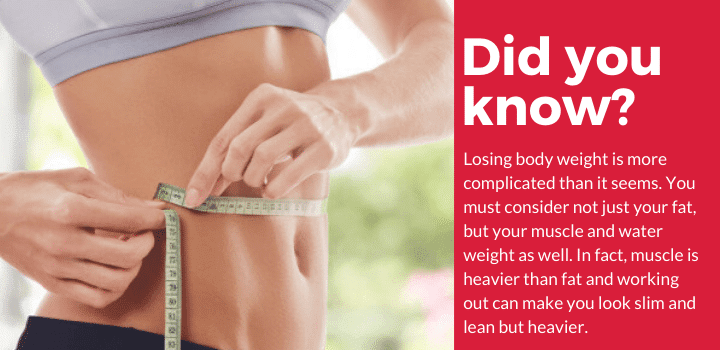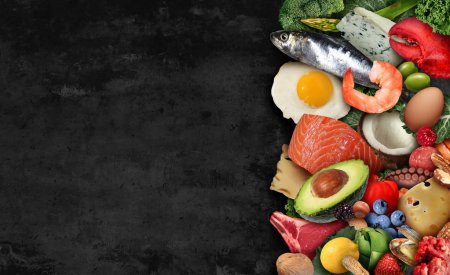Are you wondering why your weight loss has plateaued even when on keto diet? Do you know what causes it, and how to overcome it?
Then you’re in the right spot!
In this Athletic Muscle guide, I’ll be covering:
- What causes the keto plateau?
- Is it normal to plateau on keto?
- How do I get past a weight loss plateau?
- And a whole lot more!

The ketogenic (keto) diet has been touted as an effective method to not only lose weight but also effectively improve body composition at the same time by increasing retention of lean body mass and accelerated loss of fat mass.
While there is no universally agreed definition of a ketogenic approach it typically involves a predominantly fat-based diet (>75% intake) with moderate to high protein intake and minimal carbohydrate (<50g).
The sole purpose of this diet is to change the body’s primary energy source, moving from glucose (attained through carbohydrate) to ketones (a by-product of fat and other nutrients metabolism).
While this dietary approach is unique in its mechanics and possible outcomes, the underlying principles of weight/fat loss do not change.
Many are either unaware of these principles, or assume that a keto diet is exempt from these fundamental rules. Eventually, individuals will encounter a “plateau” in which weight/fat loss begins to significantly slow down or stop.
Read Also: Why Curved Treadmills are so much better for in home cardio and weight loss
This can lead to frustration, a reduction in mental health and “slipping back” into previous lifestyle habits.
Which likely contributed to the need to lose weight/fat in the first place.
What Causes the Keto “Plateau”?
The keto plateau, and virtually all weight/fat loss plateaus, is caused when an individual is no longer in a calorie deficit; that is, they’ve moved from an amount of food that would facilitate weight loss to now taking in an amount of food that would maintain their weight and or cause them to gain weight.
You see, our calorie requirements for weight loss are an ever-changing goal.
The amount you begin with, in a diet is likely not the amount you finish with depending on how long you’re dieting for, what your goal weight is and how severe the deficit is to begin with.
It is a dynamic target that we need to achieve to facilitate weight/fat loss.
So, it is no fault of your own and there isn’t anything inherently “wrong” with you and your metabolism is “broken”; it’s simply that your body’s energy requirements have changed.
Read More: Are Trifecta Nutrition Prepared Meals Good For CrossFit Athletes?
Is it Normal to Plateau on Keto?
Plateauing on any diet is expected and is why many people end up abandoning them!
The key is not to be driven by the emotional response that often accompanies a plateau (frustration, anger, confusion, etc.) but to be objective, studious and figure out why.
Problems don’t go away until you fix them.
Read More: The CrossFit Diet Guide To Help You Reach Your Potential In 2021

How do I get Past a Weight Loss Plateau?
Well, we know that our calorie intake is the culprit behind the plateau, so here are some consistently successful methods you can employ to reduce your calories and sustain/restart your weight/fat loss campaign. This is when you have to get smarter about your diet, not simply work harder.
Tracking
Tracking our food intake can be an incredibly helpful tool. This allows us to not only review the quality of our intake but also the quantity (the most important for weight loss), consistency, what foods effect is in certain ways etc.
Using an online application like MyFitnessPal would be incredibly helpful (as it has a huge library of foods with their calories and nutrients available) however using a written diary would also suffice for some
Read Also: Training Mental Toughness: 7 Mental Skills for CrossFit PRs
Portion control
One common mistake for first time “Keto-ers” is assuming they can eat as much as they like and continue to lose weight.
Initially, the scales may be changing, this is likely down to reduced food volume in the gut (from lack of fiber), changes in body water levels and reductions in glycogen rather than actual fat loss.
As we discussed the fundamental principles for weight / fat loss still exist regardless of which diet you follow.
A simple guide to portion control is to use your hand; a clenched fist for a portion of protein, half that for a portion of fat and a thumb worth sized portion for carbohydrate or two thumbs worth for veggie servings!
Restricting eating times
Simply restricting the times in which you can eat during the day can help further reduce calorie intake.
This technique is typically referred to as “intermittent fasting” (a dietary approach in its own right).
Read More: Intermittent Fasting – The End-All, Be-All Guide For Beginners
This approach may help facilitate a calorie deficit, but may also confer other benefits related to metabolism (improving insulin sensitivity for example).
Intuitive eating
Intuitive eating focuses on physiological cues (hunger signalling) for when you should eat and how much.
Intuitive eating research is still in its infancy and may be beneficial for some. However, it may not be advised for those who are overweight/obese as we know that hunger signalling is disrupted in these people and is poorly controlled.
This can be mitigated to a certain degree with higher protein intake (such as that found in many ketogenic approaches), further supporting the keto diet.
Additionally, the ketogenic diet may offer some unique benefits to regulating hunger both as ketones appear to alter the regulation of certain hormones involved in the hunger signalling process.
Read More: 20/4 Intermittent Fasting Diet (The Keto Approach)
Why am I Losing Inches but not Weight on Keto?
In the initial stages of a ketogenic approach, many individuals report a significant change in measurements, particularly around the waist and hips.
This is likely down to a reduction in food volume and inflammation-related bloating of the midsection caused by slower digesting foods (fiber and other more complex carbohydrates), high volume, lower-calorie foodstuffs (typically fruits and vegetables), added sugars (which can cause inflammation of the gut) and certain carbohydrates which some individuals may not be able to effectively digest/cause disruption to their gut environment (such as those individuals who suffer from IBS and IBD).
Additionally, there may be an initial change in carbohydrate stores as our body begins to adapt to the diet. This may reduce measurements around the body (particularly in the arms and legs) as some have reported.
As the diet progresses and the individual encounters a stall in weight loss but is still seeing a progression in their measurements, the question arises “what exactly is happening in this situation?”
Well, this is what we like to call body recomposition. The loss of fat, changes in physique, while maintaining roughly the same weight and retaining lean body mass.
Read Also: Ashwagandha for Testosterone: The Secret Weapon for Massive Gains in 2021
This is influenced both by what we do (exercise and activity wise) and also how we eat. In this instance, the ketogenic diet facilitates increased use of body fat stores to be utilized as energy.
However, the high protein content of this dietary approach will often result in individuals retaining more lean mass (which may not necessarily be the case in other diets if they are not adequately planned out).
This is also a reiteration of the fact that scale weight is only one marker of progress. How you feel, how you look, how you perform and your relationship with food as well as yourself are all just as, if not more so, important than scale weight.
Scale weight is helpful in the initial stages and when we make modifications to our dietary intake/exercise output but it is by no means the singular marker of progress and something to not be overly caught up in if you are progressing in the other aforementioned areas.
Read More: Top 5 Best CLA Supplements To Lose Body Fat And Build Lean Muscles
Conclusion
In conclusion, while the ketogenic diet may have unique benefits to improving body composition outcomes (both increasing fat mass loss and improving lean body mass retention), it is not exempt from the fundamental principles of weight loss.
Many will diet harder and not necessarily smarter when they encounter a plateau.
This often leads to more deleterious and undesired results for that individual.
Instead, after reading this article, we hope that you can now make more educated modifications to your diet and successfully continue your weight / fat loss campaigns should they reach a plateau.

